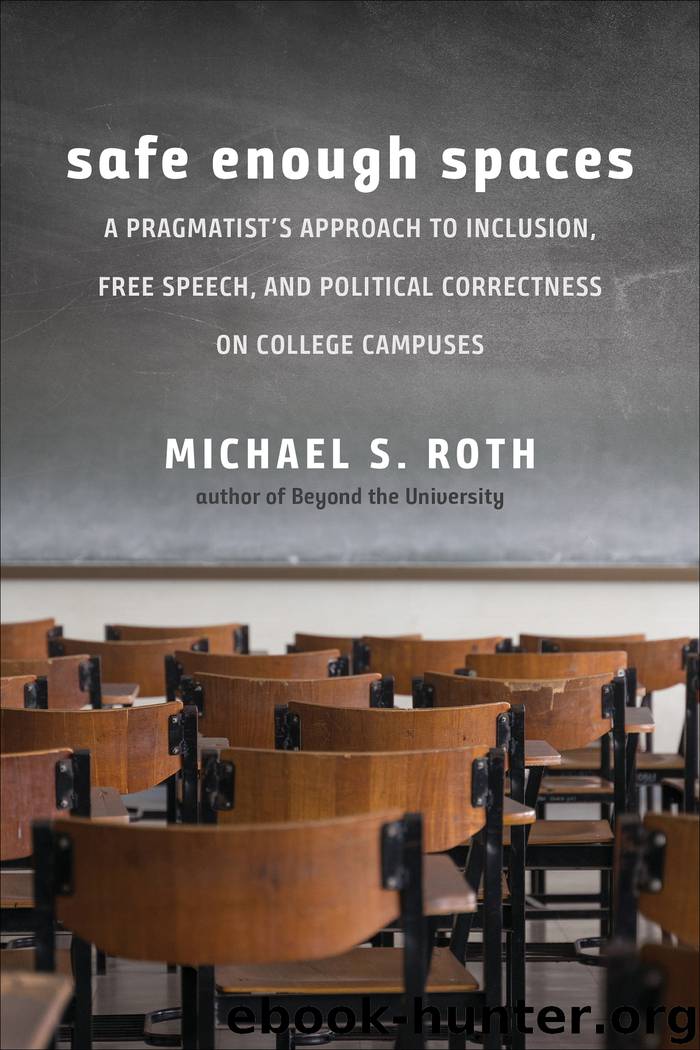Safe Enough Spaces by Michael S. Roth

Author:Michael S. Roth
Language: eng
Format: epub
Publisher: Yale University Press
Published: 2019-03-20T16:00:00+00:00
In 2015 the American presidential campaign was under way, and the Republican candidates competing in the primaries often positioned themselves in opposition to the activist types getting lots of attention on college campuses. At the beginning of that school year, The Atlantic published a widely discussed article that reframed the conversation about political correctness in a powerful way. The authors, Greg Lukianoff and Jonathan Haidt, see themselves as liberals of a sort—Lukianoff with a libertarian tilt and Haidt as more of a center-Left Democrat. Lukianoff, director of the Foundation for Individual Rights in Education, is a passionate advocate for freedom of speech. He and his organization proudly defend anyone in higher education whose First Amendment rights have been compromised by some facet of their institution. Haidt is a social psychologist interested in how moral perspectives on the world “bind and blind,” how they create both bonds of solidarity and patterns of exclusion. Their article “The Coddling of the American Mind” was one of the most popular, or at least most widely read, in the history of the magazine, and within a few years they had turned it into a bestselling book with the same title.
It’s a book that fits a pattern we have seen before. Middle-aged authors find the ways of college students to be alien, and this makes them feel out of touch, unsympathetic to the young. In the late 1960s, Ronald Reagan built his political career in California on his hostility to the ungrateful, un-American radicals protesting on Berkeley’s campus. In the 1980s, Allan Bloom transformed himself from isolated, mandarin professor to bestselling conservative scold by excoriating students for their addiction to rock music and deafness to the higher pleasures of Straussian contemplation. By the 1990s, it was common knowledge that you could attract a crowd of supporters by attacking political correctness, and in recent years we have seen that anyone with access to a keyboard or a microphone can find an audience by complaining about it.
This is the context for Greg Lukianoff and Jonathan Haidt’s The Coddling of the American Mind.25 The marketable title, assigned to them by a savvy editor at The Atlantic, was meant to evoke Bloom’s The Closing of the American Mind. Both books attempt to bring what Lukianoff and Haidt call “wisdom and its opposite” to light through a critical appraisal of what has gone wrong in higher education. For Bloom, wisdom was contained in the questions considered by the Great Books of the Western Tradition, books he feared were no longer studied with seriousness in the age of triumphant multiculturalism and philistine social science. In a move that would have made Bloom ill, Lukianoff and Haidt find “the modern embodiment of . . . ancient wisdom” in cognitive behavioral therapy (CBT).26
Cognitive behavioral therapy, at least for the purposes of Coddling, is centered on learning a set of techniques that helps one counter unproductive thought processes. When you are aware of a tendency to let your emotions run away with you, CBT teaches
Download
This site does not store any files on its server. We only index and link to content provided by other sites. Please contact the content providers to delete copyright contents if any and email us, we'll remove relevant links or contents immediately.
| Behavioral Disorders | Communicative Disorders |
| Gifted Students | Inclusive Education |
| Learning Disabled | Mentally Disabled |
| Physically Disabled |
The Art of Coaching Workbook by Elena Aguilar(48585)
Trainspotting by Irvine Welsh(20146)
Twilight of the Idols With the Antichrist and Ecce Homo by Friedrich Nietzsche(17758)
Fangirl by Rainbow Rowell(7901)
Periodization Training for Sports by Tudor Bompa(7379)
Change Your Questions, Change Your Life by Marilee Adams(6705)
This Is How You Lose Her by Junot Diaz(5849)
Grit by Angela Duckworth(4784)
Red Sparrow by Jason Matthews(4737)
Asking the Right Questions: A Guide to Critical Thinking by M. Neil Browne & Stuart M. Keeley(4645)
Paper Towns by Green John(4214)
Room 212 by Kate Stewart(4156)
Ken Follett - World without end by Ken Follett(4006)
The Sports Rules Book by Human Kinetics(3632)
Housekeeping by Marilynne Robinson(3462)
The Motorcycle Diaries by Ernesto Che Guevara(3381)
Exercise Technique Manual for Resistance Training by National Strength & Conditioning Association(3332)
Introduction to Kinesiology by Shirl J. Hoffman(3330)
Papillon (English) by Henri Charrière(3329)
